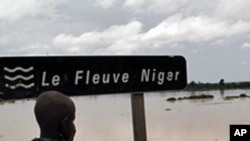The World Food Program is teaming up with FAO, The European Union, the Gates Foundation and other agencies to help subsistence farmers increase their crop yields. WFP says 2010 has been a year with many climate-related emergencies, which have created havoc with the agricultural production of many developing countries.
Some of the most dramatic climate-related emergencies in the past year include flooding in Pakistan, Burma and Burkina Faso, and the Sahel drought, which has affected the African nations of Niger, Chad and Mali among others. Haiti was devastated by hurricanes.
World Food Program spokeswoman Emilia Casella says the number of people affected by climate-related disasters is expected to reach about 375 million a year by 2015.
"But, if you look even further a-field or further in the future, we are estimating that by 2020 some countries having their agricultural yields halved by weather climate emergencies--drought or flood," Casella said. "And, if you look even farther in the future 2050, we are looking at 10 to 20 percent more people hungry due to climate emergencies."
Casella says by 2050, there is likely to be 24 million more malnourished children as a result of erratic weather. And almost half of this increase, she says, is projected to be in sub-Saharan Africa.
The World Food Program is working with the World Meteorological Organization and the United Kingdom Meteorological Office to collect data that could help prevent or prepare farmers for weather emergencies.
For example, Casella says a detailed food insecurity analysis could pinpoint areas that are most at risk, where climate emergencies would overlap with food emergencies.
She says WFP is also working with the Food and Agriculture Organization to help small subsistence farmers, who are most vulnerable to extreme weather events, increase their food yields.
"The vast majority of these small farmers are women, to help them to increase the yields for their families and have more yields so they can sell more in the market," she added. "It is also working with small farmer organizations to help them to better market their products. It is doing things such as even building roads or transport systems so that farmers in far-away places that do not have access to markets, can reach markets."
Casella says WFP is also working with the World Meteorological Organization on weather risk insurance. She says this would provide small farmers with a payout if their crops fail due to weather emergencies.
She says weather risk insurance is much more effective than giving people food after emergencies. If people could receive insurance against the loss of their crops, she explains, they could feed their families or prepare for next year's planting season.
WFP Helps Subsistence Farmers to Increase Crop Yields
- By Lisa Schlein




